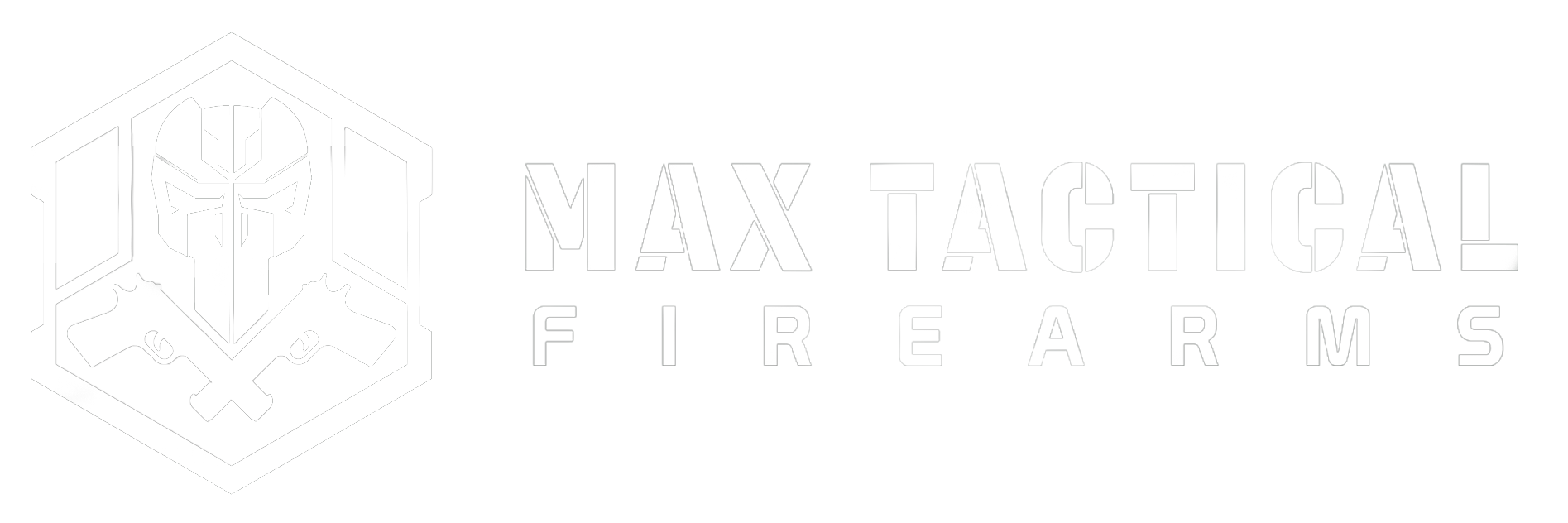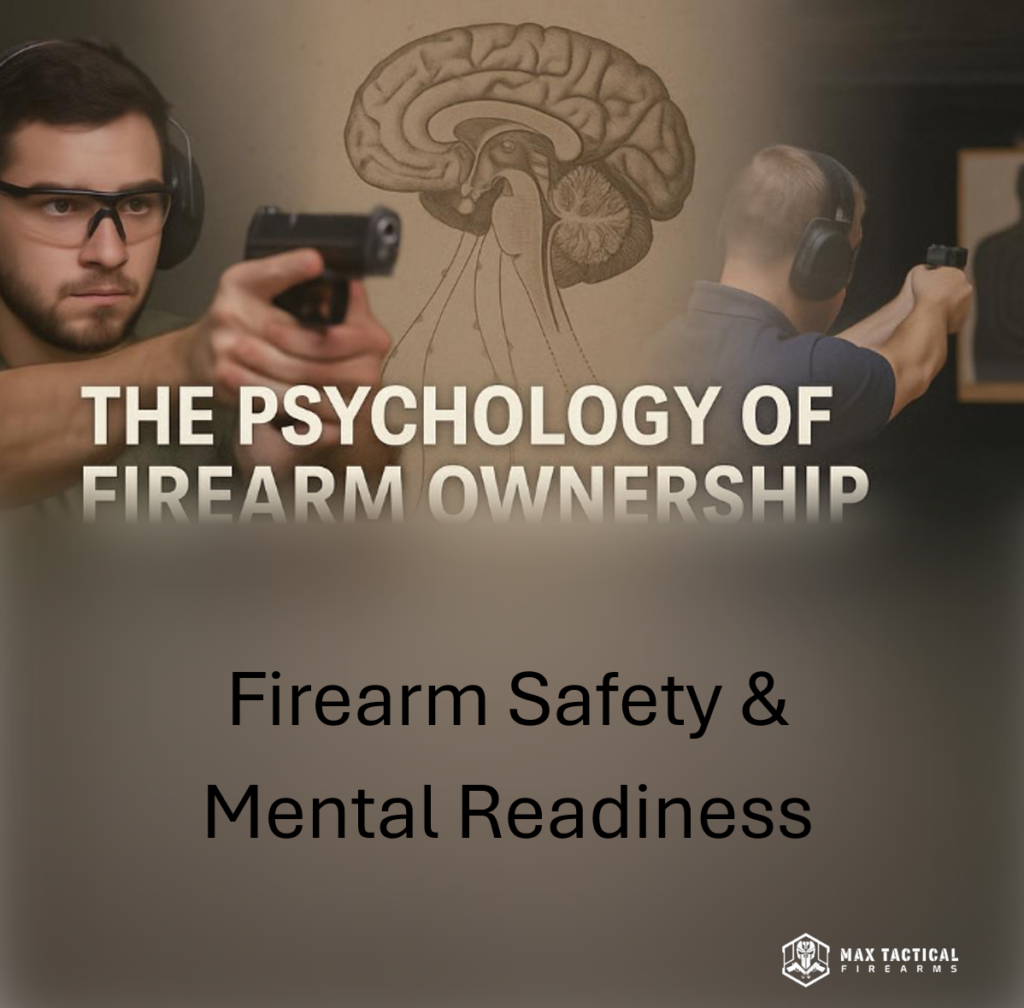
The psychology of firearm ownership plays a crucial role in responsible gun use, influencing decision-making, emotional control, and safety awareness. Understanding the mental and behavioral aspects of gun ownership helps individuals develop confidence, discipline, and preparedness in high-stress situations.
In this blog post, we’ll dive into the psychological elements that shape firearm use, offering insights into how behavioral biology influences decision-making, stress management, emotional regulation, and ultimately, the safe and effective use of firearms. Armed with this knowledge, you’ll enhance not only your skills but also your sense of responsibility and respect for the power that comes with firearm ownership.
Stress and the Fight-or-Flight Response: Mastering Your Reactions
The fight-or-flight response is one of the most fundamental physiological reactions humans have when faced with danger. This response is deeply ingrained in our biology and prepares us to either confront or avoid a threat. For firearm owners, understanding how this response works is critical, especially during high-stress situations such as self-defense encounters or competitive shooting events.
How Stress Influences Your Ability to Think and Act
When danger is perceived, the brain’s amygdala signals the release of stress hormones like adrenaline and cortisol, which prepare the body for immediate action. These hormones increase heart rate, sharpen sensory perception, and provide a burst of energy—all necessary for responding quickly to a threat. However, while these changes can enhance reaction times, they also come with potential challenges. Excessive stress can narrow your focus, impair motor coordination, and cloud judgment.
In a high-stress situation where you need to make split-second decisions, it’s easy to become overwhelmed by the heightened emotional state. You might fixate on the threat and miss important details, such as identifying the target properly or noticing a bystander in the background. For instance, in a self-defense scenario, the rush of adrenaline could cause you to inadvertently shoot too early or miss a vital element, such as assessing whether it’s safe to act.
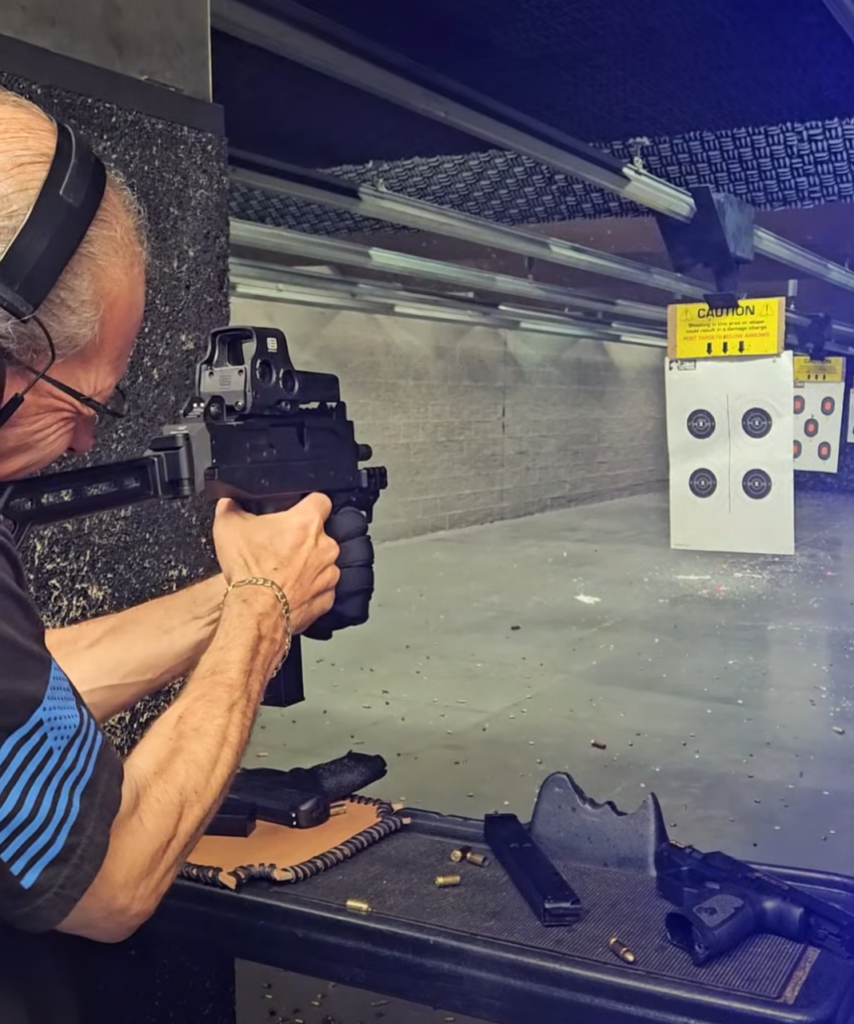
Training to Stay Calm Under Pressure: Responsible firearm ownership requires focus, discipline, and consistent practice. Building confidence through training ensures safe and effective handling in any situation.
Training to Stay Calm Under Pressure
To combat the negative effects of stress and enhance your response times, training is essential. Stress inoculation training—a technique used in both military and law enforcement—helps gun owners build resilience to stress over time. Through controlled exposure to high-stress situations, such as rapid shooting drills, timed response exercises, or role-playing scenarios, you can train your body and mind to stay calm and make better decisions under pressure.
For example, a well-designed self-defense class might involve role-playing exercises where a “threat” suddenly enters a room, and participants must decide whether to use their firearm. By practicing these scenarios repeatedly, you’ll develop a mental template for reacting quickly and calmly when the unexpected happens.
Training & Decision-Making
Understanding the psychology of firearm ownership helps shooters develop mental resilience and make sound decisions under pressure.
Cognitive Biases: Sharpening Your Decision-Making Skills
While stress is a major factor in how we respond in emergency situations, our brains also rely on cognitive shortcuts known as cognitive biases to help us make decisions quickly. While these mental shortcuts can be helpful in some situations, they can also lead us to make less-than-optimal choices in critical moments.
Confirmation Bias: Seeking Balanced Information
One common bias that affects firearm owners is confirmation bias—the tendency to search for information that confirms our existing beliefs while disregarding information that contradicts them. For example, a gun owner who is passionate about firearm rights may predominantly seek out articles or opinions that emphasize the importance of carrying a firearm for self-defense. However, they might ignore articles that emphasize the importance of gun safety, proper storage, or the risks of untrained gun ownership.
While it’s natural to want to validate our existing beliefs, it’s important to step back and consider a more comprehensive perspective. Being a responsible gun owner means seeking out diverse sources of information to ensure a well-rounded understanding. This might include reading safety guidelines, attending gun safety classes, and learning about alternative home security measures.
Overcoming Overconfidence: Regular Training and Humility
Another significant cognitive bias is overconfidence, which can manifest when gun owners overestimate their abilities. Overconfidence may lead to a false sense of security, especially after acquiring a firearm and feeling confident in one’s ability to defend oneself. The danger here is that it can result in complacency, where gun owners may not properly prepare for real-world situations, fail to train under stress, or skip safety practices.
The antidote to overconfidence is regular, deliberate practice. Just as athletes practice their skills regularly to stay sharp, gun owners must continuously work on their shooting, tactical, and decision-making abilities. For example, attending defensive shooting courses, practicing in low-light conditions, and regularly assessing your knowledge of laws and safety protocols all help to keep overconfidence in check and ensure you’re always prepared for any situation.
Emotional Control and Firearm Ownership: Fostering Responsibility
While emotions are a natural part of human experience, understanding and controlling them is vital for firearm owners. In moments of high stress or fear, emotional regulation can be the difference between making a responsible, sound decision and escalating a dangerous situation. As gun owners, we have the responsibility to manage our emotions, ensuring that firearms are used for safety, protection, and recreation, not as tools for impulsive reactions.
Managing Stress and Fear
Fear is an inherent response to a perceived threat, but it’s how we manage this fear that defines us as responsible gun owners. While it’s natural to experience fear when confronted with a dangerous situation, excessive fear can cloud judgment and lead to poor decision-making. The goal is not to eliminate fear but to learn to manage it in a way that allows for clear thinking and decisive action when necessary.
Training and preparation help gun owners regulate their emotions by building confidence and muscle memory. Repetition of drills, exposure to stressful scenarios, and understanding the physiological responses to fear allow you to take control of your emotions when it matters most. In addition, mental exercises like mindfulness can help maintain composure, improve focus, and decrease the impact of fear and anxiety.
The Role of Self-Discipline
Self-discipline is essential in ensuring that firearm use remains safe, responsible, and appropriate. This includes resisting the urge to act impulsively and focusing on thoughtful decision-making. In both training and real-world situations, self-discipline involves taking the time to properly assess the threat, ensuring that the use of a firearm is necessary and justified. For example, during a defensive encounter, it’s crucial to assess whether there are other, less dangerous means to neutralize the threat before resorting to using force.
The ability to control emotions such as fear, anger, and frustration enhances a gun owner’s ability to respond rationally, ensuring firearms are used only in appropriate and justified situations.
There’s no substitute for training when it comes to mastering firearm use. While understanding the psychology behind shooting is essential, it’s the practical application of this knowledge through training that truly shapes a responsible gun owner.
Self-Defense & Stress Management
In high-stress situations, the psychology of firearm ownership teaches individuals to control their emotions and react appropriately.
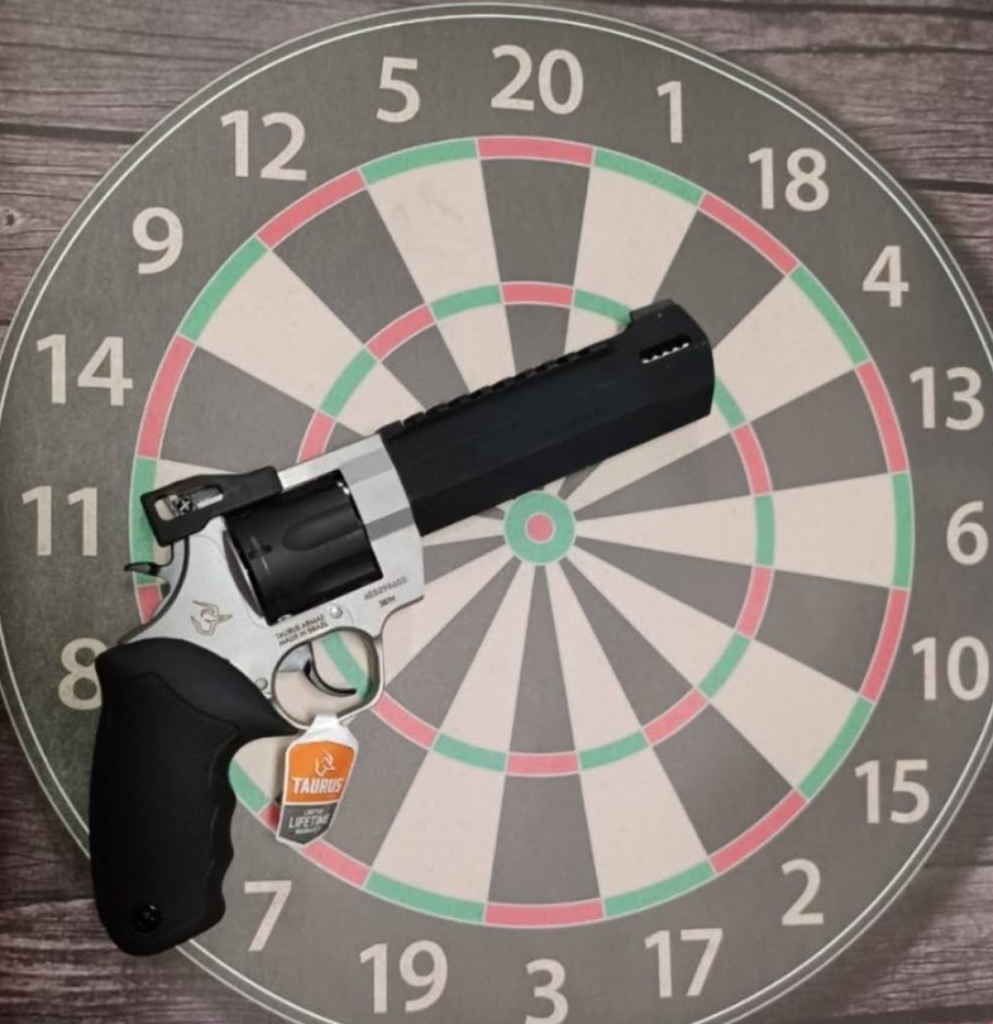
A silver and black Taurus revolver resting on a dartboard, symbolizing precision, control, and the importance of mental discipline in firearm training.
Scenario-Based Training: Realistic Practice for Real-World Situations
Training isn’t just about perfecting shooting accuracy; it’s about preparing for real-world situations. Scenario-based training is an excellent way to simulate real-life threats and learn how to respond effectively. These scenarios can range from home-defense drills to situational awareness training in public spaces. By exposing yourself to diverse, controlled training environments, you can build mental resilience, prepare for the unexpected, and improve your decision-making under stress.
For example, in a defensive shooting class, students may practice a variety of situations, such as navigating tight spaces, dealing with multiple threats, and determining when to draw a weapon or use physical force. This realistic approach helps gun owners understand the decision-making process, emphasizing caution, clarity, and rationality even in high-pressure situations.
Mental Resilience: Harnessing Mindfulness and Focus
While physical training is important, mental resilience is just as crucial. Practices like mindfulness and cognitive control can help gun owners manage stress, focus on the present moment, and improve their decision-making. Mindfulness techniques, such as deep breathing or visualization, help you remain calm and clear-headed in stressful situations. Additionally, cognitive-behavioral techniques (CBT) can help you reframe negative thoughts and better manage anxiety or impulsivity.
By incorporating mindfulness into your training, you can reduce the impact of stress and improve your overall performance. A gun owner who practices mental control alongside technical skill is far more likely to handle a self-defense situation with focus and precision.
Mental Preparedness & Responsibility
Developing a responsible mindset is a core aspect of the psychology of firearm ownership, ensuring gun owners prioritize safety and control.
Conclusion: Becoming a More Confident, Responsible Firearm Owner
Understanding the psychological aspects of firearm ownership empowers you to be a more responsible, confident, and capable gun owner. Whether it’s managing stress through training, overcoming cognitive biases to make better decisions, or controlling emotions through self-discipline, these psychological factors all play a crucial role in ensuring that firearms are used safely and responsibly.
At the heart of responsible firearm ownership lies a commitment to continuous learning, training, and self-reflection. By prioritizing both mental and physical preparation, gun owners can approach their firearms with the respect they deserve—ensuring that they are used as tools for safety, sport, and protection, not impulsive reactions. Ultimately, it’s this balance of knowledge, skills, and self-awareness that makes firearm ownership not only a right but a profound responsibility.
References
- Denson, T. F., et al. (2013). “Testosterone and Aggression: A Meta-Analysis of Studies in Humans.” Psychological Bulletin, 139(3), 724–758. https://doi.org/10.1037/a0029565
- Grossman, D. (2009). On Combat: The Psychology and Physiology of Deadly Conflict in War and in Peace. Warrior Science Publications.
- Haney, C., & Zimbardo, P. G. (2009). The Lucifer Effect: Understanding How Good People Turn Evil. Random House.
- Kessler, R. C., et al. (2006). “Post-Traumatic Stress Disorder in the National Comorbidity Survey Replication.” Archives of General Psychiatry, 63(6), 658–666. https://doi.org/10.1001/archpsyc.63.6.658
- Keane, T. M., et al. (2017). “Posttraumatic Stress Disorder, Aggression, and Violence: A Critical Review.” Aggression and Violent Behavior, 34, 14-32. https://doi.org/10.1016/j.avb.2017.06.003
- LeDoux, J. E. (2000). “The Emotional Brain: The Mysterious Underpinnings of Emotional Life.” Simon and Schuster.
- Linsky, A. D., et al. (2017). “The Relationship Between Guns, Crime, and Suicide.” American Journal of Public Health, 107(10), 1523-1528. https://doi.org/10.2105/AJPH.2017.303950
- Patton, J. H., et al. (2002). “Aggression and the Fight-or-Flight Response.” Journal of Applied Social Psychology, 32(4), 689–705. https://doi.org/10.1111/j.1559-1816.2002.tb00276.x
- Wilson, M., & Daly, M. (1985). “Competitiveness, Risk Taking, and Violence: The Young Male Syndrome.” Ethology and Sociobiology, 6(1), 59–73. https://doi.org/10.1016/0162-3095(85)90041-4
—————————————————————–
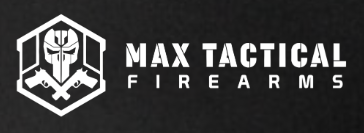
Firearms 🔫 | NFAs 🧨 | Archery 🎯 | Hunting 🦅 | Accessories 🛠️ | Optics 🔭
Max Tactical Firearms, LLC is a licensed FFL and SOT dealer offering a broad range of products for beginners to expert firearms enthusiasts. With an extensive online store featuring over 40,000+ products from more than 500+ brands, you’ll find everything from firearms and archery to hunting, camping, survival gear, optics, and more. Max Tactical Firearms, LLC also specializes in NFA items, including suppressors, SBRs, and other Class III firearms, and they ship regulated orders to FFLs nationwide while also accepting transfers. Additionally, they offer custom heirloom-grade display cases and handcrafted leather goods built to last.
🔗 Check out the full selection online: MaxTacticalFirearms.com
Note: Max Tactical Firearms, LLC ships nationwide, so you can browse the online store and place orders for shipping. If you are local, you can also contact them to schedule a pick-up, or transfer.
Questions? Need help?
Call: 623-980-3338
Email: [email protected]

